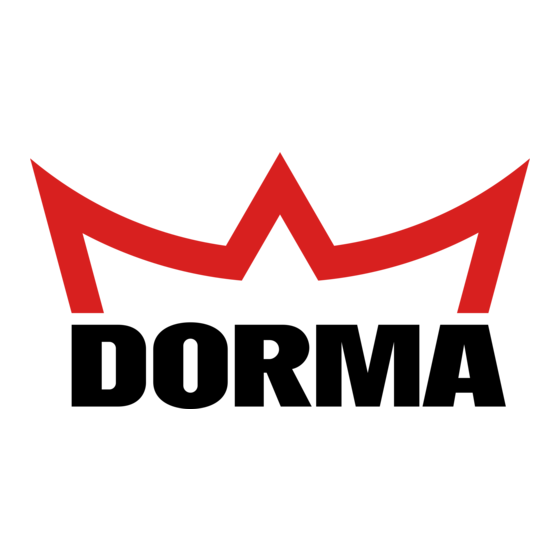
Publicidad
DORMA ITS 96 EMF
MONTAGEANLEITUNG
Technische Daten EMF
Betriebsspannung:
24 V DC
Leistungsaufnahme:
1,4 W
Einschaltdauer:
100 % ED
Auslösemoment:
ca. 25 - 65 Nm bei 90° Öffnungswinkel
(abhängig von der am Schließer ein-
gestellten Schließkraft).
max. Türöffnungswinkel:
120°
Die Ansteuerung erfolgt über externe Rauchmeldezentrale
(z.B. DORMA RMZ 2 oder RZ 01 + RM).
Montagevorbereitung
Türblatt und Rahmen gemäß Maßbild vorbereiten.
Für elektromechanische Feststellung Stromzuführung von
Rauchmeldezentrale legen.
Endkappe aufclipsen, Gleitschiene in die Ausnehmung
1
einsetzen und anschrauben.
2
Kabel anschließen
3
Schließer in das Türblatt einsetzen und befestigen.
Ventil 120°-0° schließen.
4
Schließerhebel aufsetzen.
Auf die richtige Lage des Vierkants im
Hebel achten. Nur dann ist eine einwandfreie
Funktion des Türschließers gewährleistet.
Schließerhebel um ca. 30° verdrehen.
Hebel wieder abnehmen und um 90° versetzt wieder
5
aufsetzen.
6
Schließerhebel mit Schließer und Gleitstück verbinden.
7
Schließgeschwindigkeit einstellen.
8
Schließkraft einstellen.
9
Endschlag einstellen.
Feststellpunkt einstellen
10
Spannung anlegen (24 V DC).
Türflügel öffnen und einrasten.
Schrauben lösen
Tür auf gewünschten Feststellwinkel öffnen und
festhalten.
Schrauben wieder festziehen.
Die Tür kann maximal bis zum gewählten
Feststellpunkt geöffnet werden, an dieser
Position Türstopper setzen.
Ausrückkraft einstellen
11
Je nach Türbreite und gewählter Schließergröße
Ausrückkraft einstellen.
Nach DIN EN 1155 soll das Ausrückmoment bei 90°
Türöffnungswinkel zwischen 40 - 120 Nm liegen.
Eine zu hoch eingestellte Kraft kann zu
Beschädigungen an den Türbändern und
Befestigungselementen des Türschließsystems
führen .
Funktionsprüfung
Türflügel öffnen und feststellen.
Stromzufuhr unterbrechen - die Feststellung muß
auslösen.
ABNAHMEPRÜFUNG UND WARTUNG
Merkblatt über die Verwendung von Feststellanlagen
WEITERE HINWEISE
Richtlinien für Feststellanlagen des Instituts für
Bautechnik, Berlin.
DORMA GmbH + Co.KG • Postfach 4009 • D - 58247 Ennepetal • Telefon (02333) 7930
FIXING INSTRUCTIONS
Technical Data EMF
Operating voltage:
24 V DC
Power input:
1,4 W
Rated for continuous duty: 100 %
Release torque:
approx. 25-65 Nm at an opening angle
of 90°(dependent upon the strength
setting of the door closer).
Door opening angle:
max. 120°
The unit is controlled by an external smoke detector unit
(e.g.DORMA RMZ 2 or RZ 01 + RM).
Praparations for fixing
Prepare door leaf and frame as per dimensional drawing.
For the electro-mechanical hold open, install power supply
cable from smoke detector.
Clip on the end cap, insert the slide channel in the recess,
1
and fix.
2
Conductor connections
3
Insert the closer in the door leaf and fix.
Close the 120° - 0° adjustment valve.
4
Fit the closer arm.
Ensure that the square recess in the arm is
positioned correctly as this is critical for the door
closer function.
Turn closer arm approx. 30° in the direction indicated.
5
Remove arm, turn 90° and re-fit.
6
Fix arm to closer and slide shoe.
7
Adjust closing speed.
8
Adjust closing force.
9
Adjust latch action.
Setting the hold-open point
10
Switch on power supply (24 V DC).
Open door leaf and engage hold open.
Loosen screws.
Open door leaf until required hold-open angle is reached
and hold-open in this position.
Tighten the screws.
The door cannot be opened beyond the hold
open point; fix a door stop at this position.
Setting the pull off force
11
Adjust the pull-off force to suit the door width and size of
door closer.
EN 1155 states that the release torque at 90° door opening
angle should be between 40 and 120 Nm.
If the pull off force is set too high, damage
might occur to the hinges and the fixings of
the door closer system.
Functional test
Open the door and engage hold open.
Interrupt the power supply and ensure that the hold open
mechanism releases the door.
FINAL INSPECTION AND MAINTENANCE
See instruction sheet relating to the use and application of
hold open devices and systems.
FURTHER INFORMATION
See guidelines for hold-open systems published by the
Institute for Building Technology, Berlin
national guidelines.
1)
These documents are only printed in German as
they refer exclusively to the German market.
1)
1)
or equivalent
Subject to change without notice
Änderungen vorbehalten
Publicidad
Tabla de contenido

Resumen de contenidos para Dorma ITS 96 EMF
- Página 1 Bautechnik, Berlin. These documents are only printed in German as they refer exclusively to the German market. Subject to change without notice DORMA GmbH + Co.KG • Postfach 4009 • D - 58247 Ennepetal • Telefon (02333) 7930 Änderungen vorbehalten...
-
Página 2: Istruzioni Di Montaggio
Bollettino sull’impiego di impianti di arresto. ALTRE AVVERTENZE Direttive per impianti di arresto dell’Institut für Bautechnik, Berlino Sous réserve de modifications con riserva di modifiche DORMA GmbH + Co.KG • Postfach 4009 • D - 58247 Ennepetal • Telefon (02333) 7930 Änderungen vorbehalten... -
Página 3: Opleveringstest En Onderhoud
Richtlijnen voor vastzetinrichtingen van het Institut für Bautechnik, Berlijn. Voorschriften “Een brandveilig gebouw installeren”. De lokale Brandpreventieve Dienst. Wijzigingen voorbehouden Ändringar förbehålles DORMA GmbH + Co.KG • Postfach 4009 • D - 58247 Ennepetal • Telefon (02333) 7930 Änderungen vorbehalten... -
Página 4: Control Y Mantenimiento
Hoja informativa sobre el uso de instalaciones de fijación. OTROS AVISOS Directrices para instalaciones de fijación del Instituto de la construcción en Berlín. Med forbehold for ændringer Modificaciones reservadas DORMA GmbH + Co.KG • Postfach 4009 • D - 58247 Ennepetal • Telefon (02333) 7930 Änderungen vorbehalten... -
Página 5: Instruções De Montagem
Folha informativa sobre a utilização de sistemas de retenção. OUTRAS INSTRUÇÕES Directivas do Instituto de Engenharia Civil de Berlim sobre sistemas de retenção. Reservado o direito a alteraçðes DORMA GmbH + Co.KG • Postfach 4009 • D - 58247 Ennepetal • Telefon (02333) 7930 Änderungen vorbehalten...








